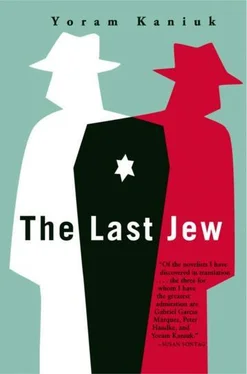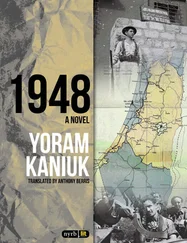I saw a father walking alone, he said. With a creased picture. He asks every soldier: Did you know him, did you know him? Me he didn't want to approach. He sat in the middle of the desert and dug, he searched for his son in a pit. Desperate. His son wasn't in the pit. All around were corpses of Egyptians. The wounded were brought from the Canal. He searched for his son in the pit, just because there was a pit there.
And there was one there who photographed a killed person, wore a kippah, and took twenty-eight pictures of the killed man from every angle until he ran out of film.
In the morning, the two of them came out of the tent. Not yet really morning, but they saw one another in the light. A pale desert light. Clear and pure. He started the jeep. She got in and sat next to him. Shadows of night and dew still mixed with sunrise. A gigantic convoy passed by them and they had to get off the road for a while and get out of the way. Sitting and looking, trucks with prisoners, soldiers with drooping heads, sleeping standing or sitting, two small buses full of singers, dancers, and mimes returning from the front, more prisoners with dead smiles spread over their faces, defective ammunition, spoils of crushed enemy tanks on carriages and command cars filled with wounded. One of the singers in the bus sang and the song was swallowed in the distant desert. The prisoners gazed with empty eyes. She flicked a cigarette. In the distance, civilians were seen, women with kerchiefs against the wind. Dogs running aimlessly, black and gray desert dogs, the light grows stronger, and a voice is heard: He comes only for wars, doesn't stay to live here, and now who will bury him? Then they drove on, a captured tank stood there, four foreign photographers wearing laced-up hats are posing the dead next to the tank. Moving the corpses and laying them in a nice position. While the photographers quarrel about where to put the last corpse of the rout, he spits and starts the motor. A soldier comes to them with a jerrican full of coffee. In the distance shots are heard. Three horses whinny and gallop toward the jeep, and she says: Like in the movies, while he takes out a transistor and puts it to his ear. The horses gallop and the shots cease. And then the horses disappear in the gigantic plain and shots echo once again.
People, old, young, women wrapped in kerchiefs, lie curled up in the desert. In their hands they hold photos. On their faces is the terror of the dream that may not be a dream anymore. He says to her: In an hour I'll take you back to the teleprinter! He wants her in the wet sand of the morning dew in the filtered and serene light, and when they stopped at a damaged car they saw a soldier connecting an electric razor to the battery and shaving. He stood naked in the morning chill and trembled. The soldier asked: Are you by any chance not dead people searching for their parents?
You're a son-of-a-bitch, he said to the soldier, we're going to make us our sons right here.
So who's the son-of-a-bitch here, said the soldier and went on shaving.
In the evening, after the teleprinter, he waited for her as if he hadn't seen her in a year. They went to the culture center. A month ago, Nasser said here that he'd throw the Jews into the sea. This doesn't look like a sea, said some sergeant major. But he wasn't laughing now. Airplanes tore the sky in sudden sallies. An arrogant atmosphere of numb tension prevailed. They sat facing a television set. They set up an antenna to receive broadcasts from Jerusalem that were just starting. Through the former Egyptian transmitter they can see the end of the war in the north. And H. Herzog talking about our forces. I'm drinking the wine of Latrun brought by the conquerors of Latrun, he thinks, and looks at H. Herzog talking about our forces, how terrific is H. Herzog, he's a General (Res.) and can talk; what and where to. He's also combed and talks with abysmal seriousness about wars. Wars aren't such a serious matter, H. Herzog. Our forces are a youth with a paper flower who shaves naked at a destroyed car and then dies. Or first dies and then shaves. Our forces is a man with a James Bond case who comes to wars from America and they're still drinking his whiskey here. Our forces is also H. Herzog himself telling what our forces are, what they do, did, will do.
When they went out they looked toward a dark point lighted for a moment by two spotlights. In the crisscross of the spotlights a half-track of the Burial Society was seen. Instead of a cannon, a hut was set up there. In the hut were our forces, their memory for a blessing. He said: See how they pack the children whose parents are searching for them in the sands. People dressed like crows with sidelocks and ritual fringes, and love thy neighbor as thyself, they put the children in the hut on the half-track. In their hands they hold prayer books they'd sometimes stick in their coat pockets. Even the driver wears a kippah, but he doesn't wear a coat over the prayer shawl. A young Hasid stood there, his face very pale, looked at the crisscross of the lights and sang: This is what my heart desires, pity please and do not overlook… He's also our forces, H. Herzog, he said.
When Boaz came to Rebecca's house, the old woman said, The Captain died. Boaz didn't respond but went into the bathroom, waited until the great-grandson of Ahbed brought him new clothes, filled the bathtub with hot water, and sat for a long time and rubbed his body. Noga phoned and he told her the Captain died.
Tape / -
Captain (Colonel) Jose Menkin A. Goldenberg died three days after the war began. That was one of the rare days when Rebecca allowed the Captain to come when it wasn't Wednesday night. When he drank the eternal tea the great-grandson of Ahbed poured for him, he saw Rebecca's legs under the table. He said: I see through the dress, as if your clothes were transparent, I don't see anything but bones and spots, he added pensively. Outside, supersonic booms were heard, and Rebecca said: Watch out, Captain, you look like you are covered with clouds. The Captain said: When we stood on the Kastel and talked about the memorial to Dante, I knew there would be a war, I saw an army ready, but it wasn't ready, I saw things that were to happen and that means I'm one foot in the future and the future of a person over eighty years old isn't an alternative to death anymore. And Rebecca said something and almost regretted the tone that didn't suit her, she said almost pleading: Don't die yet, I think I need you. He said: Interesting how beautiful you look without the clothes that disappeared from you, and she blushed and said: One by one they all go, don't let him take you, Menkin… not yet. Rebecca looked in his misty eyes and in her mind a memory surfaced of the river that pierced her, a sourish taste of blood rose from her insides to her lips and she said: When you see me naked after fifty years, Menkin, and I recall how I became pregnant from the river and begat Boaz, I start to be fond of you, Menkin…
In his attempt to smile, the Captain felt his bones dissolving, he stood up, kissed Rebecca's hand, and very slowly walked to his house. She watched him, but because her vision was blurred, she could see only an unclear mass walking on the path planted by Dana. The mass disappeared into the house and suddenly her throat felt dry. The Captain came to his room and felt the air running out of his lungs, his throat was choked, his body heavy. He lay in his bed, very slowly stretched his legs, even though it hurt, lit the table lamp, put his false teeth in a glass from which he sipped a little water, then he shook the glass to drizzle a little water on his hair, the glass was almost emptied, and he put his hat on his chest, his sword across his body, didn't take off his boots, but polished the medals he pinned on, and with his last strength, with a comb he held in a trembling hand, he combed the wet hair, and unable to see himself in a mirror he folded his hands, and when he saw the phosphorescent clock showing three a.m., he managed to pound the clock, stop time, and die.
Читать дальше












